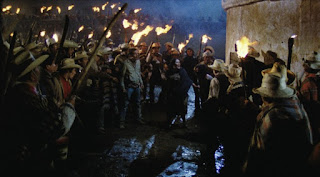Canoa: A Shameful Memory
Country - Mexico
Political upheaval in a tight-knit Mexican community leads to a savage outburst of violence against a group of outsiders accused of being communists in this shockingly brutal film that is sadly based upon a true story. Canoa: A Shameful Memory examines the build up to this tragic event, highlighting the tumultuous history surrounding the town's growth and the abuse of power by those in positions of great influence.
Director Felipe Cazals presents this eye-opening account in the style of a documentary and this approach adds gravitas to his film's powerful and bleak message. He makes it clear from the very start that we will bear witness to the full disturbing incident, with his cautionary warning acting as an intriguing hook for those willing to delve into this traumatic reconstruction of the vicious and brutal events that shocked a nation. The considered build up to the town's inception of a lynch mob and the subsequent persecution of five innocent men ratchets the tension close to unbearable levels; there is a palpable sense of dread that permeates the ominous atmosphere, leaving the viewer genuinely fearful of that which is yet to come.
In a film with a clear focus on realism, the naturalistic performances of the cast shine through; from the hostility of the townsfolk to the petrified reactions on those of the receiving end, making Canoa a compelling but challenging experience to endure. The grim reality of the savage punishments executed by those who take the law into their own hands is a tough ordeal for the viewer - with much of the visceral violence veering dangerously close to the extremes seen in the horror genre. This is scarier than most horror films though as, in the back of your mind, there is a constant awareness that this traumatic episode actually happened - dramatically altering the lives of all who suffered and survived through the terrifying nightmare.Part of what makes the film so chilling is that we are invited into the lives of the victims and come to respect their good-natured sense of comraderie and longing for adventure that leads them to Canoa on the way to scale a nearby mountain. Although they unintentionally rile up a handful of locals by singing on the overcrowded bus to Canoa, they do nothing that comes close to justifying the horrific treatment they receive. It is simply a tragic case of being in the wrong place at the wrong time.
The bold direction taken by Cazals in realising this powerful picture is especially impressive when you consider it was made only eight years after the events, yet it still takes an intrepid swipe at the ruling authorities it depicts, in particular the corrupt priest who encouraged the townsfolk to take action against these so called 'intruders'. The clarity of Cazals alarming vision is strengthened by his close adherence to the facts and his clear desire to share this outrageous story in an uninhibited fashion, showcasing the worst aspects of those who ultimately bear part of the responsibility for this tragedy.Although the film culminates in a harrowing and relentless nightmare, there are many mesmerising shots of the beautiful Mexican countryside that precede this, highlighting the relative peace and tranquility of this awe-inspiring location of a town overlooked by an imposing mountain before the situation takes a turn for the worse. The film-makers clearly have a great love for their country and you can feel how appalled they are by the barbarous actions of those who are swept along with the tide, condemning their actions with a sombre and heartfelt coda that symbolises the urgent outcry of a nation in turmoil.
There is nothing more encouraging than seeing a country come to terms with its troubled history and by documenting these horrific crimes in a remarkable film, Cazal has ensured that this travesty will never be forgotten. As haunting and poignant as it is, Canoa remains a powerful work of art that acts as a vital history lesson whilst also being a truly chilling and unforgettable piece of cinema.If you take the time to watch Canoa: A Shameful Memory then it would be awesome if you could also take the time to let me know what you thought of it, either by commenting below or tweeting me @filmbantha. Thanks, and enjoy!





No comments:
Post a Comment